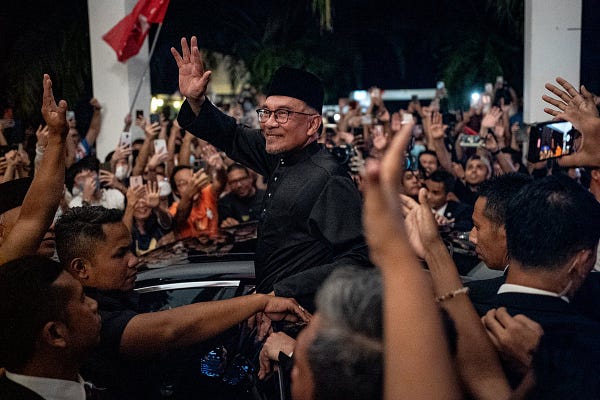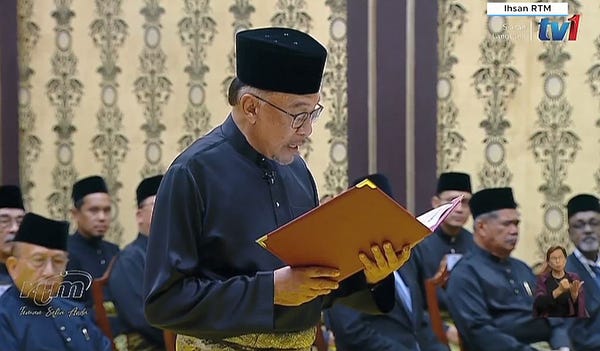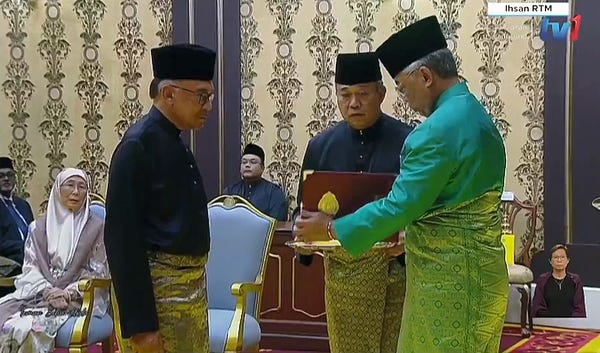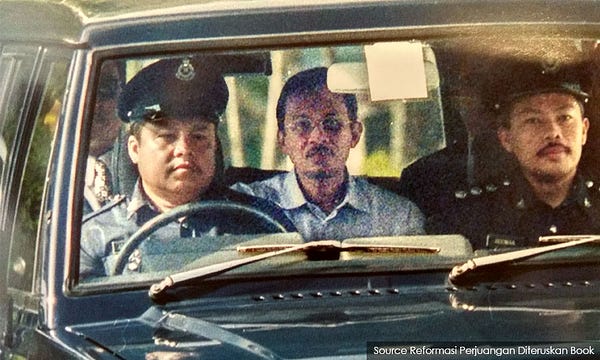Hello friends!
Firstly, apologies for radio silence last week. I was in Bangkok with a group of friends who haven’t been all together since well before the pandemic. We all went to a fantastic music festival together and I was hungover for an entire week and I realise now I am not just fun old but approaching oof my shoulders hurt old.
There are two winners in the Malaysian election, beyond the MPs. The voters, of course. And the banner makers of the country that turned around congratulatory banners for Anwar Ibrahim within hours of the announcement. This one above was posted AS he was being sworn in, which I think must be a record, surely.
Also, the media of Malaysia. Days and days of waiting at various gates with microphones and cameras to keep the country and the world up to date! Hard work and immense respect for them.
Before we start, I want to have a quick musing on why this may seem a little late to be writing. This election has stumped me and made me think a bit more deeply about what I’m trying to achieve here with Dari Mulut ke Mulut. I am not equipped to reflect and analyse the deep-in-the-weeds political fray that elections like this show us.
Others are spectacular at this (do I need to yell BETWEEN THE LINES one more time?) and trying to emulate that would just embarrass us all. This is partly why I’m very proud to be commissioning work from young writers who inform me just as much as they do newsletter subscribers.
This newsletter is an odd project because when I write about Indonesia, I’m writing for all readers except Indonesians. Likewise, the Philippines and Thailand and every other country we talk about here. I have tried very deliberately to become a generalist of the region and that sometimes makes me feel a bit anxious about the depth of coverage here.
Sidebar: I had a very interesting conversation with a friend of the letter from Italy who referred to the newsletter as “niche,” something I’ve also heard a lot in Australia. Friends in Southeast Asia say it is very broad. It’s all perspectives, isn’t it!
What I’ve tried to do today is outline and equip non-Malaysian readers for the next few weeks or months of Anwar Ibrahim’s leadership. The nitty-gritty is deeply fascinating and for that, I, of course, recommend Between the Lines.
And now, let’s crack in!


Do you think the moment you learnt Anwar Ibrahim had been appointed is one of those moments you remember forever? I was sitting at a very cool (almost too cool) cafe in Bangkok with a friend, also a nerd, and I saw it on Malaysiakini and said ‘holy shit, it’s Anwar!’ and then my pal also said ‘holy shit.’ And then I did no work for an hour. I’m not even Malaysian and it felt like witnessing history!
So, how did we get here? It certainly did not look like a sure thing early last week when none of the three coalitions returned the 111 seats needed for a majority government. This resulted in a hung parliament or, for the Australians among us, hell. It is Malaysia’s first-ever hung parliament and sparked some very serious fears about the direction it would take. Dare I say it, Malaysia was at the crossroads. And thus began the horse trading and dramatic visits to see the King. The politicking looked, to me, like it was leaning towards Muhyiddin Yassin in a patchwork coalition. But the King backed Anwar and here we are.




Sworn in Thursday evening, Anwar is deeply aware of the perceptions of instability and vowed a confidence vote next month (discussed further below). King Sultan Abdullah Ri'ayatuddin isn’t as concerned with that as with getting a move on and getting government back to work.
“His Majesty also advised the prime minister and the new government to take immediate charge to provide people a stable government to enhance the economic landscape and national development,” a palace statement said after a meeting with leaders Thursday morning, via Nikkei Asia.
Anwar will not be given a honeymoon period. He’s been a political figure for decades and has been after this spot for almost as long, so fair enough I say. This also isn’t the time for any honeymooning. Malaysia’s been dealing with this political crisis since the advent of the pandemic and it’s time to move on, rebuild, all those buzzwords etc.
So far, the signs seem good. During last week’s uncertainty, he told supporters he had no intentions of taking the full prime ministerial salary if appointed and has stuck to that. While deliberations on cabinet appointments are continuing he’s also flagged lower ministerial salaries and cuts to bloated offices.
He’s also calling the opposition’s bluff. Perikatan Nasional chairman Muhyiddin Yassin — and Malaysia’s shortest-serving prime minister — wants a vote of no confidence the minute the new parliament sits. It feels a bit icky to me, but I also understand that cobbled-together coalitions and prime ministerial appointments by the monarchy doesn’t exactly scream supply guarantee. (I know I keep saying this, but dang Malaysia and Australia really are cousins in this type of political mess 🤝)
Ramkarpal Singh, an MP in the Pakatan Harapan coalition and a big-time lawyer, made a point earlier that it’s not a constitutional requirement to demonstrate a majority with a vote in parliament. But Anwar wants to do it anyway:
“Yes, it is true Ramkarpal has used the argument about the federal constitution angle because there’s a clear majority, but I also discussed [the importance] of showing legitimacy, in terms of political perception,” he said yesterday, as reported by Benar.
Sounds wise.
The support of Barisan Nasional is an interesting one. The coalition, and particularly the dominant party UMNO, took a battering and returned its worst result yet. Where the party lands in the cabinet is still being debated but it is clear that some internal reflection and reform (and, likely, drama) are coming. That’s something we will explore further down the tracks when the dust settles.
I was very struck by the response online. My timeline of Malaysian tweeters is highly curated to largely black- and rainbow-flag emojis featuring in user names. These people — friends! — are young and progressive which is not entirely representative of course, but they have a lot to lose. There is a mix of optimism, relief and vows to keep the government accountable to promises:

Further reading:
A fascinating thread of replies here on a tweet from friend of the letter Max Walden who also pondered the question of: why does Indonesia love Anwar so much? Very intriguing responses:
GE15: Democracy Unexpected (Between the Lines)
Much of what happened in GE15 must be understood as not necessarily a vote for PN, but a protest vote against Umno. Rather than reform after its losses of 2018, the party opted not to fundamentally change its leadership. Ironically, Najib’s protégé and party president, Ahmad Zahid Hamidi brought the party down further.
The issues were 2-fold. First, Zahid himself embodied concerns about corruption due to his ongoing criminal court cases. He should not have portrayed himself as “in charge”, the effective PM candidate. He was one of the least popular figures in GE15.
Yet, it was the second factor, the decisions of Zahid’s leadership (or lack thereof) that proved decisive. He openly talked about legal cases, he cut warlords without even the courtesy of discussing it with them, and he pushed former premier Ismail Sabri Yaakob aside. Every campaign poster with Ismail served to remind voters of how he was treated.
Anwar, at last Malaysia's PM, aims to turn 'hope' into reality (Nikkei Asia)
Anwar's Pakatan Harapan has become the biggest political force in the country, with 82 seats, but remains well short of a solo majority. On Thursday, Anwar insisted his government will be a stable one. "There will be no questions of instability in my administration," he said, promising a confidence motion in December to prove he has parliamentary support.
Besides the years of political turmoil and the legacy of 1MDB, Malaysia, like most countries, faces gathering global economic headwinds amid the lingering COVID-19 pandemic and the Ukraine war. Anwar is promising a steady hand in these tough times. "We will never compromise on good governance, the anti-corruption drive, judicial independence and the welfare of ordinary Malaysians," he told reporters.
The man who fulfilled his goal to lead Malaysia (BBC)
After decades of waiting in the wings, Anwar Ibrahim has been appointed Malaysia's prime minister.His appointment is the result of a decades-long political journey that saw him almost elected to the job - not once, but twice.
He was imprisoned for years under the leadership of political titan Mahathir Mohamad, who was also Mr Anwar's one-time mentor.
The rollercoaster relationship between the two men would come to define not only Mr Anwar's fortunes, but also Malaysian politics - and Mr Anwar's place in it.








Hey if you want an informed local's perspective on Anwar I'm happy to help